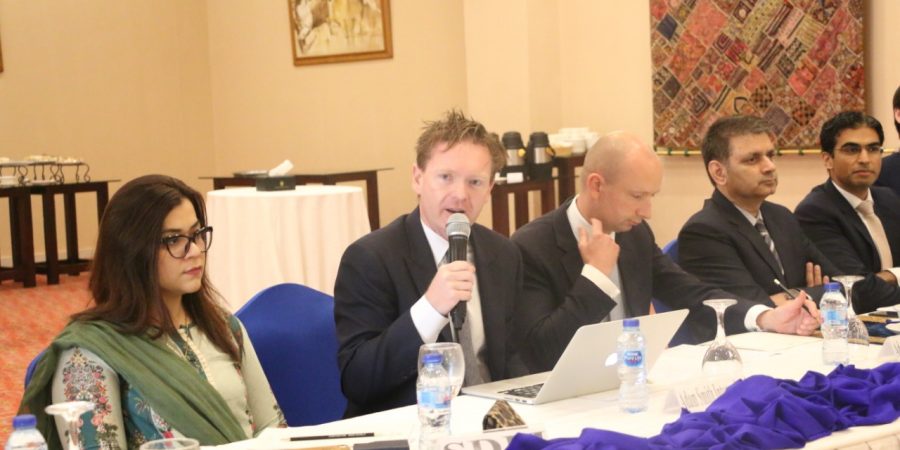Simplifying tax regime can help achieve fiscal sustainability, Experts

ISLAMABAD, OCT 16 (DNA) – Experts on Wednesday called upon the government to simplifying the tax regime through reducing tax compliance cost with the help of digitisation of tax authority processes and enhance capacity and skills of human resource to help achieve much needed fiscal sustainability.
Experts said this during a policy symposium on “Agenda for Tax Reforms in Pakistan” organized by the Sustainable development Policy Institute (SDPI) in collaboration with Adam Smith International here at Islamabad.
Director General, International Taxes, Federal Board of Revenue (FBR), Dr. Muhammad Ashfaq Ahmed said raising tax revenue still remained the major challenge for FBR, where despite broadening of tax base, there was no significant contribution to the total revenues.
“FBR is working on removing or minimising tax exemptions and concessions to help raise tax revenues”, he said. While realising the need for improvement in tax compliance and filing mechanism, he said an advance and user-friendly ICT system is critical for improved tax compliance and a way forward for FBR.
Joint Executive Director, SDPI, Dr Vaqar Ahmed said that we need to critically see how capacities at the federal and provincial tax authorities need to be enhanced.
“Improved capacities are required to formulate progressive tax policy, expedite administrative reforms, putting in place effective digitization of FBR processes, moving to risk based audit, and introducing a single portal for filing tax returns”, he said.
The current understandings regarding how provinces can move towards tax harmonization also remains weak, as provinces have expressed reservations regarding the memorandum of understanding shared by FBR, he added.
Such delays in streamlining federal-provincial communication on tax matters continues to increase the compliance costs of tax payers and ultimately keep Pakistan at a lower level of global rankings on ease of doing business, he remarked.
He stressed the need for promoting evidence-use and practice of internal evaluation at the tax authorities, which is currently being performed by outside consultants.
Chief Executive Officer (CEO), Adam Smith International, Jonathan Pell said that high cost of compliance hinders startup culture to grow and discourage the businesses to file taxes. He stressed the need for collective response and efforts to overcome the challenges of tax reforms.
While stressing the need Pakistan’s fiscal sustainability, Lead Public Sector Specialist, World Bank, Clelia Rontoyanni said under Pakistan Raises Revenue project, World Bank is assisting FBR to create a sustainable increase in country’s domestic tax revenue.
“The project will assist in simplifying the tax regime and strengthening tax and customs administration”, she said adding it will also support the FBR with technology and digital infrastructure and technical skills.
Representing the business community, former president, Islamabad Chamber of Commerce and Industries (ICCI), Mohsin Khalid said though, there has been much hue and cry about tax reforms by the incumbent government, but on the contrary there are around 60 different direct and indirect taxes which business community is forced to pay.
“The incidence of double taxation at provincial as well as federal level is an example of poor management of FBR” he lamented adding stressed the need for harmonization and enhance coordination between tax authorities at federal and provincial levels.
Representative of the All Pakistan Textile Mills Association (APTMA), Asad Abbas while highlighted the plight of the textile sector said that domestic yarn is being taxed highly 17% as compared to the imported yarn.
He said such taxation measures are negatively impacting the businesses, especially the textile industry in the country, which requires urgent attention.
The symposium had also participation from Overseas Investment Chamber of Commerce and Industry, GIZ Pakistan, Punjab Revenue Authority, Federation of Pakistan Chamber of Commerce and Industry, Rawalpindi Chamber of Commerce and Industry, SEED ventures, JICA Pakistan, SMEDA, Institute of Chartered Management Accountants of Pakistan, NAYATEL, Pakistan Business Council, USAID, PAK WOMEN and Independent Power Producers Association.=DNA
===============
Related News

China Exports Drop More Than Expected in Setback to Recovery
Islamabad, Apr 12 (DNA): Experts lauded China’s role in advancing Hybrid Rice cultivation in Pakistan,Read More

PSX closed at historic high level of 69,619 points
ISLAMABAD, Apr 8 (APP/DNA): The 100-index of the Pakistan Stock Exchange (PSX) continued with bullishRead More


Comments are Closed